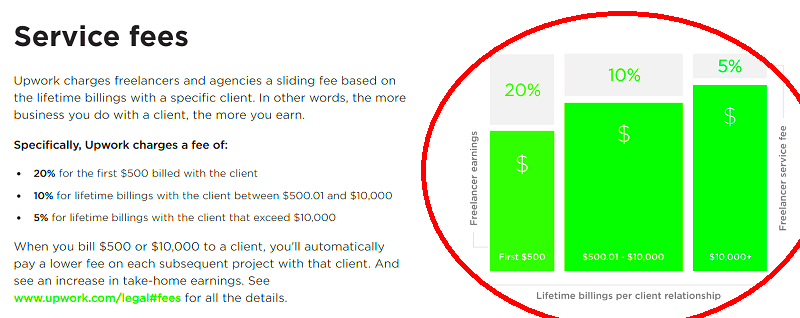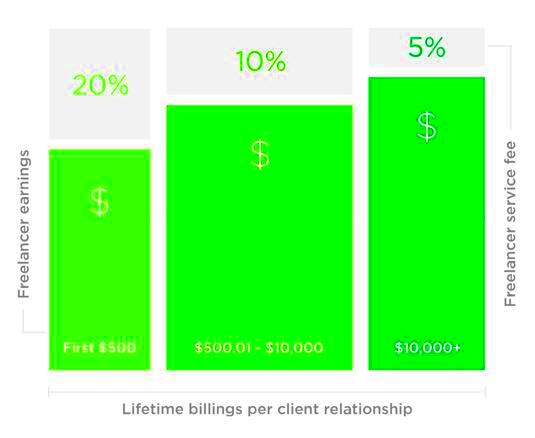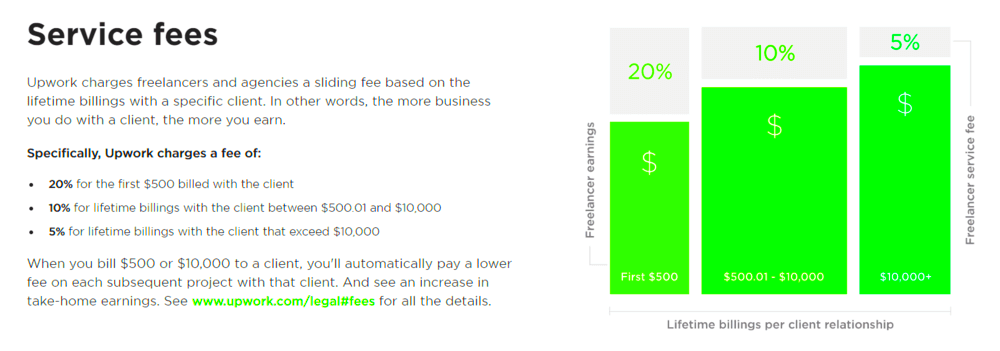Upwork gives freelancers the advantage of working with many clients and limitless job opportunities. Yet, this is not free as Upwork charges service fees for every assignment; therefore, freelancers need to understand their implication on their payment. Knowing about them can help you manage your finance and make the right decisions while accepting contracts whether you are new or seasoned in freelancing on Upwork. This post aims to simplify the Upwork pricing system hence enabling the remote workers to see ways through which they can reduce such fees.
How Upwork Service Fees Work

A percentage of the overall sum that freelancers get paid for their services is charged by Upwork based on the work done for a client. This fee applies across all contracts irrespective of the kind of assignment you are undertaking. It is structured in such a way as to motivate stable connections between freelancers and clients by lowering the costs with increased cumulative client earnings over time.
This is a simple rundown regarding how do the service charges function:
- When you first start working with a client, Upwork charges a 20% fee on the first $500 you earn from that client.
- Once you’ve billed over $500 but less than $10,000 to a client, the fee drops to 10%.
- For any earnings beyond $10,000 from the same client, the fee decreases to 5%.
With this arrangement of how much people pay for a service, it encourages the freelancers to have a long term relationship with their clients because the more you earn from that client, the lesser your charges are going to be.
Also Read This: How to Remove Your Payoneer Account from Fiverr
Breakdown of Upwork's Tiered Fee Structure

An easy table will be used to explain how the tiered fee structure works better:
| Earnings from Client | Upwork Fee Percentage |
|---|---|
| $0 - $500 | 20% |
| $500.01 - $10,000 | 10% |
| $10,000+ | 5% |
To better show you what I mean:
- If you earn $1,000 from a client, you’ll pay 20% on the first $500 ($100), and 10% on the next $500 ($50). So, in total, you’ll pay $150 in fees.
- If you continue working with the same client and earn $15,000 in total, you’ll pay 20% on the first $500, 10% on the next $9,500, and 5% on the remaining $5,000.
Freelancers may be able to project, after taking away the upwork’s fees, what they will be earning once they understand this analysis.
Also Read This: Why Was My Fiverr Gig Denied? Understanding the Common Reasons and Solutions
Additional Costs Freelancers Should Know About

Even though Upwork’s service costs remain primary charges freelancers undergo, they aren’t the only ones. Your income can also be negatively affected by other expenses which need to be considered if income is to be managed efficiently. The other expenditures should be known so that you do not find yourself in a situation where some deductions arise without plan.
Aside from this there are some other expenses freelancers need to be aware of:
- Withdrawal Fees: Upwork charges a small fee depending on how you choose to withdraw your funds. For example, bank transfers typically come with a flat fee (e.g., $0.99 in the U.S.), while PayPal or Payoneer transfers may have different costs depending on your country.
- Currency Conversion Fees: If you’re working with clients from different countries and withdrawing payments in a different currency, Upwork applies a currency conversion fee. This fee can range from 2-3% of the converted amount.
- Connects Cost: Freelancers need “Connects” to submit proposals on Upwork. Connects are not free, though Upwork provides some as part of your membership plan. Freelancers may need to purchase additional Connects to apply for more jobs, with each Connect costing about $0.15.
- VAT (Value-Added Tax): Depending on your country of residence, Upwork may charge VAT on their fees, adding another layer of cost.
- Membership Fees: Upwork offers a free Basic membership plan, but freelancers can opt for the Plus plan, which costs $14.99 per month. The Plus plan gives you more Connects, greater visibility, and other perks.
Individually, they might look negligible threats; nevertheless cumulatively they might be hazardous especially for people handling different contracts.
Also Read This: How to Post a Job on Fiverr: A Step-by-Step Guide
How to Minimize Upwork Fees

Even though there are fees you must pay when working as a freelancer on Upwork, it is possible for yo to come up with ideas that will help you avoid paying much money in fees which can reduce your total earnings greatly. Understanding how to deal with your clients and handle payments means that you will retain a bigger percentage of the money that goes into your account after every payment.
Following some simple suggestions will help you reduce Upwork expenses:
- Focus on Long-Term Clients: Since Upwork reduces fees as you earn more from a single client, building lasting relationships is key. The more you earn with a client, the less you pay in fees. For example, earning $10,000 from one client means you only pay a 5% fee on anything beyond that amount.
- Negotiate Higher Rates: Instead of focusing on lowering the fees, consider negotiating a higher rate for your services to offset Upwork’s cut. A higher hourly or project rate can help balance the percentage taken by Upwork.
- Be Selective with Proposals: Since you have to pay for Connects to submit proposals, don’t apply for every job. Focus on jobs that match your skills and have long-term potential. This not only saves you Connects but also increases your chances of securing high-value contracts.
- Withdraw Strategically: To avoid multiple withdrawal fees, try withdrawing your earnings in larger amounts less frequently, rather than small amounts every week.
These approaches can greatly cut down your costs while raising the amount of money you make on Upwork.
Also Read This: How to Follow Up with Someone on Fiverr to Hire You
Comparing Upwork Fees with Other Freelance Platforms
Despite perceived exorbitance of Upwork’s fees by some freelancers, it is crucial to note its comparison with other freelance platforms on popularity scale. Different platforms employs varying methods for charging freelance workers for services rendered; thus knowing these differences would help in decision making on what platforms one should concentrate his/her attention on.
Upwork charges a fee, and this is how it compares with the fee structure of other poplar platforms:
| Platform | Service Fee | Other Costs |
|---|---|---|
| Upwork | 5% - 20% (depending on earnings from a client) | Connects, withdrawal fees, currency conversion |
| Fiverr | 20% flat fee | Withdrawal fees, service fees for sellers |
| Freelancer.com | 10% or $5 (whichever is greater) | Bid fees, withdrawal fees |
| Guru | 5% - 9% (depending on membership level) | Transaction fees, membership fees |
It can be observed from the table that Upwork’s fees are variable according to the revenue generated from every client, unlike Fiverr and Freelancer.com that usually impose a flat rate. Even though Upwork may seem cheaper when it comes to long-term projects, other platforms may be more appropriate for short-term jobs or casual gigs. Therefore, it is imperative to examine which platform suits best with own kind of work and earning objectives.
Also Read This: Is Using Fiverr Safe? A Comprehensive Guide
Is Upwork Worth the Fees for Freelancers?
Freelancers often question if Upwork’s prices are reasonable. With Upwork, prices vary from five percent (5%) to twenty percent (20%), which makes people curious about whether or not it pays off in relation to its advantages. However, this depends majorly on one’s aspirations, nature of job and level of gratification gotten from using this platform. Let us look at some significant factors that could guide you in making a choice on whether or not Upwork is worth it for you.
Upwork may deserve your cash for various purposes.
- Access to a Large Client Base: Upwork is one of the largest freelancing platforms, offering access to clients worldwide. This means more opportunities to find work that matches your skills.
- Safe and Secure Payments: Upwork provides payment protection, ensuring that you get paid for your work. With escrow systems in place, you’re less likely to deal with payment issues.
- Higher Earning Potential with Long-Term Clients: As you build relationships with clients, the fees decrease, allowing you to keep more of your earnings. For ongoing projects, the 5% fee is competitive.
- Comprehensive Freelance Tools: From time tracking to project management, Upwork offers tools that help freelancers manage their work efficiently. These tools add value beyond just connecting freelancers with clients.
Nevertheless, it could be that Upwork is not the right choice for everyone. If you are looking for a low-fee platform to find short-term or one-off jobs, then the fees of Upwork may appear to be limiting. But whatever happens in life must happen; in most cases, advantages surpass costs on this site mainly due to those individuals who are willing to engage with it over a long period.
Also Read This: What Happens If My Order on Fiverr?
FAQs About Upwork Fees
Users of Upwork sometimes have questions regarding the platform's rules and charges for freelancers. For this reason, below are some frequently asked questions with their corresponding answers to help bring out any obscurity.
-
- Q: Does Upwork charge fees on all types of contracts?
A: Yes, Upwork charges its service fees on both hourly and fixed-price contracts. The fee is deducted from your earnings before the payment is released to you.
-
- Q: Do I pay more fees if I work with multiple clients?
A: The fee structure applies per client. So, if you work with multiple clients, you’ll pay the highest tier (20%) on the first $500 earned from each new client.
-
- Q: Can I avoid Upwork fees?
A: Unfortunately, there's no way to avoid the platform fees. However, you can reduce them by focusing on long-term client relationships and increasing your earnings with individual clients to unlock lower fee tiers.
-
- Q: Are Upwork’s fees tax-deductible?
A: Depending on your country’s tax laws, Upwork fees may be considered a business expense and could be tax-deductible. It’s best to consult a tax professional to understand how to claim this.
Conclusion
Initially perceived as exorbitant, Upwork’s commissions are however part of the exchange for engaging with a site that comes along with many different customers, protected payment systems and necessary means to run projects on a freelance basis. Even though you need to note down service charges and other expenses like currency change and money withdrawal costs ,still most freelancers regard Upwork as an investment because it opens up doors together with security solutions.
Freelancers can make the most out of Upwork’s offers and also maximize their incomes through emphasizing development of long-lasting relations with clients, selecting high-value tasks due diligence paying little fees.




